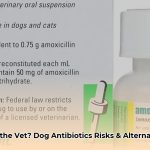Decoding Your Dog’s Itch: 8 Flea-Free Culprits
Your dog’s relentless scratching is driving you both crazy, yet a flea check comes up empty. So, what’s the itch? Just like humans, dogs can experience itching for a myriad of reasons beyond fleas. This guide explores eight common culprits and offers vet-approved solutions to help your furry friend find relief.
1. Environmental Allergies: The Sneaky Itch Trigger
Pollen, dust mites, mold—these environmental allergens can trigger itching in dogs just as they do in humans. Seasonal itching, sneezing, or paw licking may suggest allergies. Managing environmental allergens can make a big difference. Regularly cleaning your home, washing your dog’s bedding, and using an air purifier can help minimize exposure to irritants. Your vet might recommend allergy testing to identify specific triggers and prescribe antihistamines or other medications for relief.
2. Food Sensitivities: The Dietary Itch
Certain ingredients in your dog’s food, such as beef, chicken, dairy, or wheat, could be causing an allergic reaction manifesting as itchy skin, digestive upset, or ear infections. If you suspect a food allergy, talk to your vet about an elimination diet to pinpoint the offending ingredient(s). Switching to a hypoallergenic diet might be necessary.
3. Yeast Infections: The Musty Itch
Yeast infections, like Malassezia dermatitis, often create a musty odor accompanied by itching, redness, and sometimes darkened skin. These infections thrive in warm, moist areas like skin folds and ears. While some suggest topical coconut oil application with caution, consulting your veterinarian is crucial for proper diagnosis and treatment, which may involve antifungal medications.
4. Bacterial Infections: The Hot Spot Itch
Bacterial infections can lead to hot spots—those angry, red, often oozing sores—causing intense itching, pain, and sometimes pus or scabs. Consult your veterinarian for appropriate antibacterial medication, which may be topical or oral.
5. Dry Skin: The Flaky Itch
Dry, flaky skin can be incredibly itchy, especially during winter. Coconut oil, oatmeal baths, and humidifiers can help moisturize and soothe dry skin, while adding fish oil or flaxseed oil to your dog’s diet can improve skin health from the inside out.
6. Contact Dermatitis: The Irritant Itch
Just like humans, dogs can develop contact dermatitis from irritants like certain fabrics, cleaning products, or plants. Localized itching, redness, and swelling are common symptoms. Identifying and removing the irritant is key, while aloe vera gel or cool compresses can offer some relief.
7. Parasites (Mites, Lice): The Creepy-Crawly Itch
While you’ve ruled out fleas, microscopic mites or lice could be the culprits. These parasites burrow into the skin or cling to the fur, causing intense itching, hair loss, and skin irritation. Consult your veterinarian; they will likely recommend parasiticidal medication.
8. Underlying Health Issues: The Internal Itch
Sometimes, itching is a symptom of an underlying health condition like hypothyroidism, Cushing’s disease, or even anxiety. These conditions require a vet’s diagnosis and a tailored treatment plan. Diagnostic testing and specific treatment will be necessary. If your dog seems unusually anxious or stressed, increased exercise, environmental enrichment with toys and puzzles, and even behavior modification may be beneficial.
Soothing the Itch: Vet-Approved Home Remedies
While addressing the underlying cause is crucial, several home remedies can offer temporary itch relief for your dog:
- Oatmeal Baths: Soothe inflamed skin and relieve itching.
- Diluted Apple Cider Vinegar Spray: Some believe it helps balance skin pH; however, use with caution and always dilute appropriately.
- Aloe Vera Gel (Pure, Latex-Free): Soothes irritated skin, particularly beneficial for hot spots.
- Coconut Oil (Topical): Moisturizes dry, itchy skin and provides a protective barrier.
- Fish Oil/Flaxseed Oil (Dietary Supplement): Improves skin health from within, rich in omega-3 fatty acids.
- Humidifier: Adds moisture to the air, preventing dry skin.
When to Seek Professional Help
While home remedies can provide temporary comfort, it’s essential to consult your veterinarian if:
- Your dog’s itching persists or worsens.
- Open sores, hair loss, or other concerning symptoms develop.
- Your dog seems unwell beyond just being itchy.
Your veterinarian can provide an accurate diagnosis, perform necessary tests (skin scrapings, allergy testing, blood work), and recommend the most effective treatment plan for your furry friend’s specific needs. Don’t hesitate to seek their expertise—your dog’s comfort and well-being depend on it.
Disclaimer: This information is for educational purposes only and is not a substitute for professional veterinary advice. Always consult your veterinarian before starting any new treatments for your pet.
- Meditation Guide Book Picks from Top Mindfulness Teachers - February 22, 2026
- Best Books to Start Meditation for Beginners and Skeptics - February 21, 2026
- Essential Books On Mindfulness For Beginners To Find Calm - February 20, 2026













